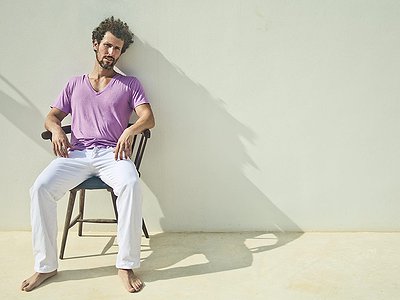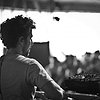The relationship with the audience is crucial for a DJ, and yet it seems to be a fragile one. How do you see the balance between giving the crowd what they want and treating them to something new? Do you believe in the possibility of "reading an audience" – and how do you put it into practise? Is the relationship with the dancers a collaborative one or, as Derrick May once put it, a “battle”?
As stated above. The three things I find important as a DJ are: 1) entertain 2) educate and 3) create an aural atmosphere and journey.
Learning this balance is key for me. It's not always about playing the biggest tracks to get people to pogo and fist pump. Lots of people can do that. It’s fun and important to take chances and try different things. I believe this helps create a rounded and balanced DJ.
Could you try to describe what makes you decide to play a particular record during one of your sets? What makes a strong transition from one track to the next from your point of view, for example, and how do you see the relative importance of establishing a flow versus creating tension through suspenseful breaks in continuity?
Not really sure if I can explain it. It’s more of a feeling I get from the music I'm about to play and the spontaneity of energy flow. I like the story telling of a DJ set; starting someplace and not knowing where you’re going or even how you got there; but you sure enjoyed the trip.
I like not feeling scared to take chances or do something risky and then learning from the experience. I like taking crowds up and down, like the symbiotic dance of the fisherman and the fish; a pull/push tension between the two. I love it!
DJs that just press play on their laptop may have given technology a bad name, but without technology, there'd be no DJing in the first place. What's your perspective on the relationship and the balance between technological advances, music and the art of DJing? In which way have particular technologies perhaps concretely changed your style of DJing? Do you believe in the idea of progress in DJing?
I’m not the person to say people should or shouldn’t be doing something. However, a lot of my friends who have been DJing for years on vinyl or CDs made the switch to `sync` from manual beat matching and it works fine. It simply takes a little less concentration of energy spent on matching tempos and focuses more on track selection and extra production whilst performing. So, they're not simply focusing on matching two tracks. They hit play, automatically sync two or more songs, then centre around looping, controlling internal/external efx, drum machines etc... I think there is a definite art form to this. There are some people who do it really well, and some people who simply just do it.
Those that shine are those who have knowledge and understanding of their tools. I am a firm believer that you can give multiple people a pencil (a tool) and ask them to create something with it; and your results will vary. Some will write a poem, some will draw, some will poke holes in the paper, some will colour or some will break it and make a sculpture. You can't predict creativity! I love being able to create new music out of pre-existing music through manipulation and kind of giving it my own style and sound; I love the spontaneous work flow.
People are often speaking about the demise of the club scene, but the experience has remained as potent as ever. Why, do you feel, has the club remained such a great place for the discovery and appreciation of electronic music? How do you see the relationship between music and the space it is performed at?
It’s changing. It used to be that a DJ could break a record by playing it at a club. Then it became about radio DJs noticing the underground potential of a track, then they broke it on radio. Now, there is the internet and a club or radio DJ doesn’t need to do a thing and a track becomes viral on it’s own. Yet, I think there is a special and unique relationship that a DJ or performer has with their crowd and tracks can build hype through grassroots word of mouth. But, it’s a different story now with the whole online aspect of viral music hype. I can go to a gig, record a DJ playing a track with a smart phone and instantly put it on Facebook, Twitter, Vine etc and there you have it: instant hype. Crazy!
In how much, do you feel, is the club experience shaped by cultural differences? Do you, when travelling, take these cultural differences into consideration – and in how far has your approach as a DJ perhaps even benefited from playing in different countries and in front of different crowds?
When I get asked by friends “Where are you travelling next?” and I may say Taipei, or Beirut (to name a couple). Their reply is always “Wow, do they have a scene?” or “Do they have clubs?” or “How do they know about dance music?”, or the best one is “Do they dance differently?” It’s funny because I think why wouldn’t they have a scene and of course they have healthy and amazing clubs and venues.
So yeah, culturally speaking, festivals and clubs worldwide are kind of the same. Some are more vocal than the others (yelling, screaming, enthusiasm) or they might allow smoking or not, or drinking or not, or age limits on entry. But, this is everywhere, and I don’t see it so much as a cultural thing. Now if you want to see big cultural differences worldwide, let's talk about religious approaches to music and dancing and how it fits into rituals. That’s a big one!
Visit Josh Wink's website at www.joshwink.com



